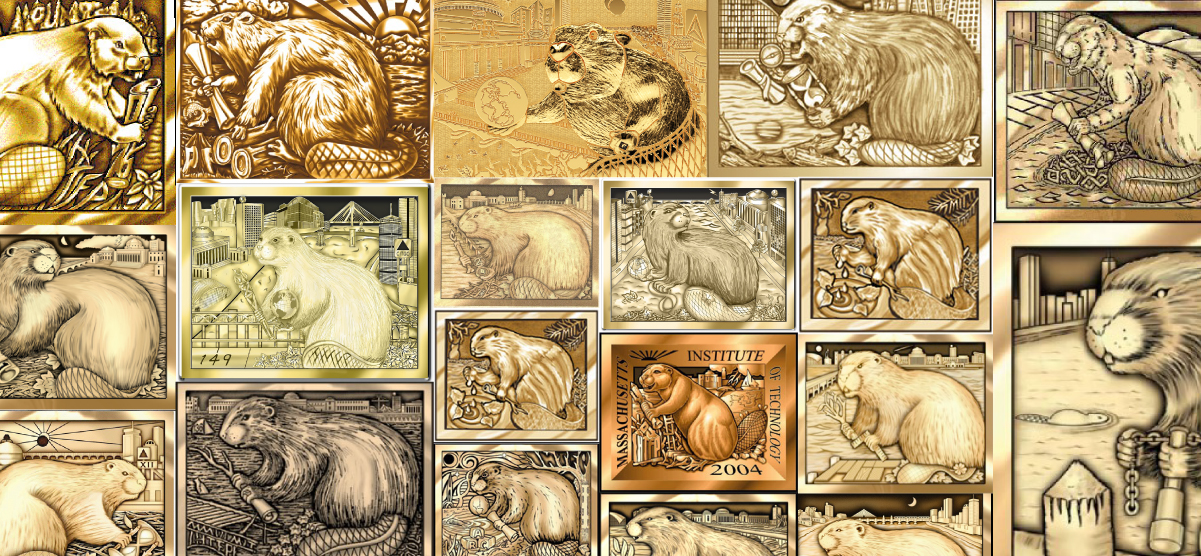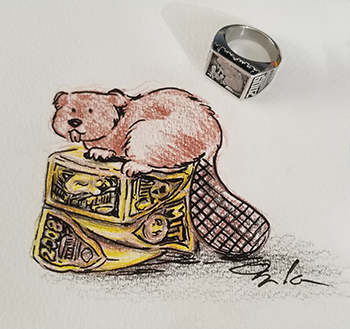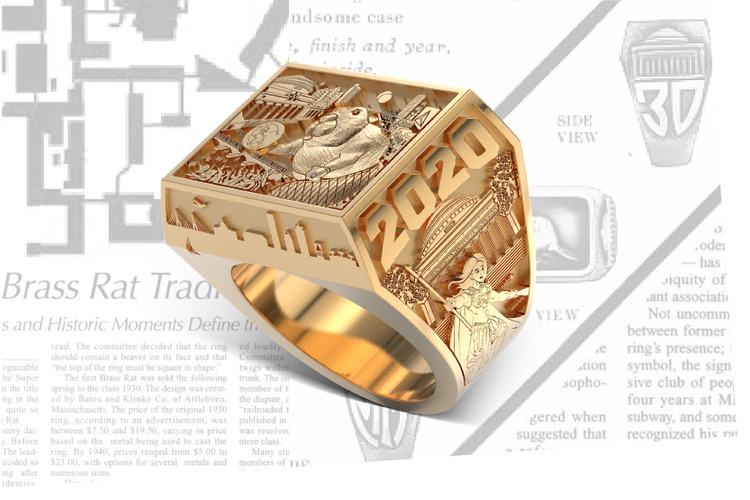A Brief History of the Brass Rat
-
-
Slice of MIT
- 19
Filed Under
Recommended

Many things have changed about the MIT Brass Rat over the years, yet it remains one of the most recognizable rings in the world—a unifying symbol of solidarity that comes from earning an MIT degree.
The details of its history are sometimes cause for friendly debate. We’ve searched archives and conferred with alums to round up the (mostly) agreed-upon facts that trace its journey, from the quiet 1927 debut to the 2020 design that has become a symbol of connection to a geographically dispersed graduating class.
1927: Before this time, MIT had no class ring. The Class of 1927 begins the tradition with a generic design.
1929: The student committee for the first custom MIT ring, officially named the Standard Technology Ring, commences work on a design to be worn by the Class of 1930. They debate whether to feature the Great Dome or the beaver on the bezel. The clever and industrious mascot wins, earning the ring its enduring nickname of “Brass Rat.” Contrary to that moniker, the rings are available only in gold or sterling silver.
1940: In the early years, the rings do not change much, with slight variations based only on who produces the ring. In 1940, the ring committee suggests that the Brass Rat be redesigned—after much discussion and polling, however, the idea is dropped.
1963: The Standard Ring Committee disbands. Class committees, which take responsibility for the ring, remain faithful to the original standard, making only minor alterations in ring design from year to year.
1975: Students begin to break with Brass Rat tradition. As Bill Hecht ’61, SM ’76 (CEO of the MIT Alumni Association from 1980 to 2003) would later recall, “Classes started fussing with the beaver, making it bigger, fatter, more beaver-like; the old one was more rat-like.”
1979: A Brass Rat is temporarily attached to the finger of the John Harvard statue at MIT’s Cambridge neighbor, Harvard University.
1980: The Brass Rat makes its first big screen debut in the movie Stir Crazy, worn by Grossberger (played by MIT alum Erland Philip van Lidth de Jeude ’76).
1984: The first ring premiere event is held to unveil the Class of 1986 design, during the spring of their sophomore year.
1987: Controversy ensues over the Class of 1989 ring design, which reverses decades of precedent by having the beaver facing to the right instead of the left.
1988: Silhouettes of the Boston and Cambridge skylines are added to the side bezels of the ring by the Class of 1990 committee, necessitating a change in the ring’s manufacture from a three-piece mold to a five-piece process. Mindful of the longstanding tradition of rotating the direction of one’s ring upon graduation, the decision is made that the Boston skyline will face students until they graduate, and thereafter they will see the Cambridge skyline, in effect looking back at campus. (Most alums can cite an informal meaning of the ring rotation tradition, though its origin is unclear.) Although the Class of 1991 committee chooses to omit the skylines, a version of them will reappear on the 1992 ring and every year to follow.
1996: Astronaut Kenneth D. Cameron ’78, SM ’79 delivers a talk at the Institute and presents President Charles M. Vest with a paperweight-size version of a Brass Rat that he had taken to the Russian space station Mir.
1999: The tradition of holding a ring delivery event—a formal occasion for sophomores to acquire their Brass Rat—begins with the Class of 2001.
2000: The Class of 2002 alters the official MIT seal for the first time, replacing the traditional figure of the male bearded scholar with a woman, and the blacksmith’s hammer with a picket sign.
2003: A committee is formed to design a “Grad Rat” specifically for MIT students with a graduate degree. Previously, graduate students’ only class ring option was to purchase a generic version of the ring from the Coop and add their degree year to the shank.
2006: A giant Brass Rat is precision-manufactured to fit the barrel of a cannon from Caltech’s Fleming House appropriated in an MIT hack. The Brass Rat is reclaimed before the cannon’s return, and will later go on view in the MIT Museum.
2007: A “hacker’s map” is added to the underside of the Class of 2009 bezel, showing each tunnel and basement connection on the MIT campus. (We're told that a general campus map was first added in 1999, did not appear in 2000, and then was added consistently every year since.)

2008: The Brass Rat appears on the hands of both Tony Stark and Lt. Col. James “Rhodey” Rhodes in Iron Man.
2016: Stephen Meyer ’64 is reunited with his Brass Rat 50 years after losing it while washing a car on a visit to Alabama.
2016: The Brass Rat makes another blockbuster appearance when it is spotted on the hand of physicist Erin Gilbert in the Ghostbusters reboot.
2020: On Friday, May 29, the Class of 2020's graduating class was the first to turn its rings from locations all over the globe. The Brass Rat figured into Commencement celebrations held virtually, due to MIT’s campus being closed because of the Covid-19 pandemic. Learn more about the Class of 2020 Brass Rat.
We know this list is incomplete, but if you have some facts or points in history we missed that you’d like to suggest be added, please comment below.

Class of 2020 Brass Rat








Comments
David Berry
Sat, 05/23/2020 9:39am
Brass rat history
You over-sanitized the reason for turning the ring on graduation, and it started long before the skylines were added in 88.
EVERYONE knows that the Tute (the beaver) s...s on its undergraduates. But after you graduate, you s... on the world.
Randy Berry ‘68
Brenda Bell
Sun, 04/04/2021 6:46pm
There's turning the ring, and there's turning the ring...
There is a ring rotation custom not specific to MIT that friends and family are invited to rotate the ring 360 degrees in the direction of the owner's pinky finger. The owner is required to solicit as many turners as the last two digits of the graduation year. I was first introduced to this custom in high school, and found it continued through my years at MIT.
Norman Guivens
Sat, 05/23/2020 11:33am
Ring on John Harvard Statue
One nuance -- according to reports in campus newspapers at the time, the "brass rat" replica affixed to the finger on the Statue of Three Lies in Harvard Yard actually was made of paper mache.
Oh yes -- the inscription on the Statue of Three Lies contains three lines --
John Harvard
Founder
1938
if I remember correctly, and each of the three lines is false. There's no known likeness of John Harvard (a student posed for the sculpture in the 19th century), he was not the founder, and the year has nothing to do with anything. So much for veritas...
Norm Guivens '79
Stavros Macrakis
Sat, 05/23/2020 3:22pm
Sort of.
It says 1638, which is when John Harvard died and left money to Harvard, which had been chartered in 1636.
https://en.wikipedia.org/wiki/Statue_of_John_Harvard
Christine Santos
Sat, 05/23/2020 11:58am
"Stir Crazy"
Grossberger in "Stir Crazy" wore the brass rat because the actor, Erland Van Lidth de Jeude, portraying him was MIT '77.
Julie Fox
Tue, 05/26/2020 3:20pm
Slice update
Thanks for pointing this out! We have updated the story to include this detail. –Slice of MIT editors
Yolanda Hinton
Wed, 05/27/2020 1:59pm
Erland Van Lidth de Jeude '76
Erland may have received his degree in 1977, but I recall him being class of '76.
Daniel Christman
Thu, 10/29/2020 10:13am
(No subject)
Erland was ‘76 as am I
Daniel Kamalic
Sat, 05/23/2020 12:21pm
Class of '99 campus map!
Don't forget the campus map on the inside of the ring that was introduced for my Class of '99 ring! One of my favorite things about my Rat. Interestingly, if I recall correctly, it was removed for the Class of 2000 ring after some '99ers got scarring on their fingers from it ("MIT left me with permanent scars, literally!"), and was then reintroduced for the 2001 ring in a shallower relief which didn't cause that skin irritation of the first design, and I understand that the map has persisted since the all the way up to the current ring!
Daniel Kamalic
Sat, 05/23/2020 12:27pm
Map was first introduced in '99, not '07!
The map was introduced back in '99, not '07!
Thomas Dobroth
Sat, 05/23/2020 1:15pm
Gold Prices Soared in 1980
In my year (class of 1982), the price of gold soared and the rat became unaffordable. My father, class of '50, decided that we would share his ring. I inherited the ring and have it now.
Win Treese
Sat, 05/23/2020 5:38pm
Spotted in 1980s Lands' End catalogs
In the mid 1980s, one of the models in some of the Lands' End clothing catalogs was wearing a brass rat. In some cases, his hand is positioned to display it prominently.
Paul Rudovsky
Sat, 05/23/2020 9:16pm
1966...MIT corrects years of errors as U's switched to V's
The 1966 ring was the first to utilize V's instead of U's in "Massachusetts Institute of Technology" just below the Great Dome.
Charles McCallum
Sun, 05/24/2020 4:22pm
(No subject)
I graduated in 1960, and my ring has an image entirely different from those pictured in the article. I have worn the ring every day since graduation, with the exception of a couple of hospitalizations some years ago. I was in Paris in December 1961, visiting an MIT classmate during Christmas break at the University of Manchester (UK), where I spent a year as a Fulbright Scholar. When I boarded the airport bus that in those days took passengers from the aircraft to the terminal there was not enough seating, and I stood with my right hand (Brass Rat showing) holding a stirrup. A young man seated just in front of me tapped me lightly and said "MIT?", displaying his Brass Rat at the same time. In that crowded bus full of mostly French-speaking travelers, I felt good that I had met someone who had similar memories of the Institute and who was undoubtedly, like me, polarized around science.
Robin Raine
Sun, 05/24/2020 6:45pm
Class of '81
The class of '81 moved away from only using 2 digits in the year to the whole number (1981) since upside down, that's the year MIT was founded.
Floyd Skeels
Mon, 05/25/2020 5:16pm
Pre-Rat
I have the class ring of my wife's grandfather, Edward Wendell '25. It is not a brass rat but it does have the seal. It may have been custom made. I would be happy to send a picture.
Teri Centner
Wed, 05/27/2020 5:41pm
gavel
Today I learned that the class of '96 rat has a gavel on it to represent MIT's role in the Overlap antitrust lawsuit. http://tech.mit.edu/V114/N13/ring.13n.html
Bruce Bottomley
Fri, 05/29/2020 8:52am
Two grads meet on an elevator
They spot each other's Brass Rats. One says "6". The other replies "8". Or so the story goes.
Perhaps I'm a reactionary, or just an old man, but I'm very happy with the basic, classic, time enduring appearance of mine from 1965. And if we met on an elevator, I'd say "6".
Arleen Feng
Mon, 06/15/2020 4:14pm
memories from 1973 Ring Committee
My single undergrad venture into biological research determined that the beaver's tail should not resemble a tennis racket. Our group also put "73" in the sticks below the beaver and "LXXIII" on the dome facade on one of the sides. I recall we also had a rendering done showing a left-handed screw protruding from the dome but cooler heads prevailed (or chickened out) on the final design.